16-01
Israel Worshiped Idols [16-01]
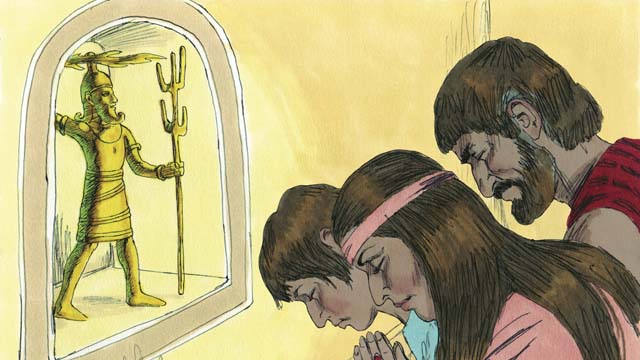
After Joshua died, the Israelites disobeyed God and did not drive out the rest of the Canaanites or obey God's laws. The Israelites began to worship the Canaanite gods instead of Yahweh, the true God. The Israelites had no king, so everyone did what they thought was right for them.
约书亚死后,以色列人又不顺服神,他们不再驱赶迦南人,也没有遵守上帝的律法。以色列人开始崇拜迦南人的神,放弃了唯一的真神。以色列人没有国王,所以他们为所欲为。
Important Terms:
Translation Notes:
- and did not drive out – This tells how they disobeyed God, so in some languages it may be better to start this as a new sentence, "They did not."
- drive out the rest of the Canaanites - This can be translated, "fight with the rest of the Canaanites to force them to leave the land."
- or obey God's laws - This means that the people also disobeyed the laws that God gave to the Israelites at Mount Sinai.
- the true God - That is, "the only real God." Yahweh is the only one that people should worship.
- what they thought was right for them – This means that they all did whatever they wanted to do, including many evil things.
16-02
Enemies Defeated Israel [16-02]
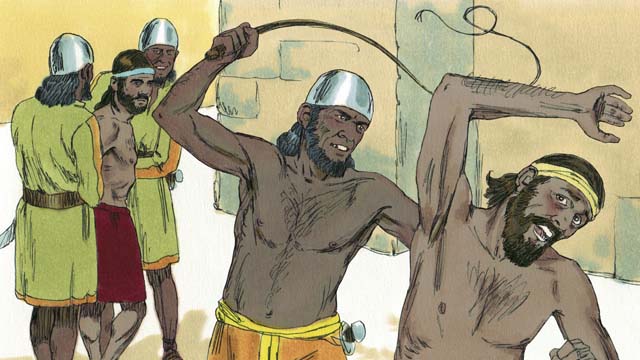
Because the Israelites kept disobeying God, he punished them by allowing their enemies to defeat them. These enemies stole things from the Israelites, destroyed their property, and killed many of them. After many years of disobeying God and being oppressed by their enemies, the Israelites repented and asked God to rescue them.
因为他们违背神的旨意,上帝不断派遣他们的敌人来攻打他们,以此作为惩罚。这些敌人偷盗他们,毁坏他们的财物,还杀了很多以色列人。多年以后,以色列人忏悔所犯的罪过并且祈求上帝来拯救他们。
Important Terms:
Translation Notes:
- asked God to rescue them - That is, they asked God to help them and to set them free from their enemies.
16-03
The Deliverer [16-03]
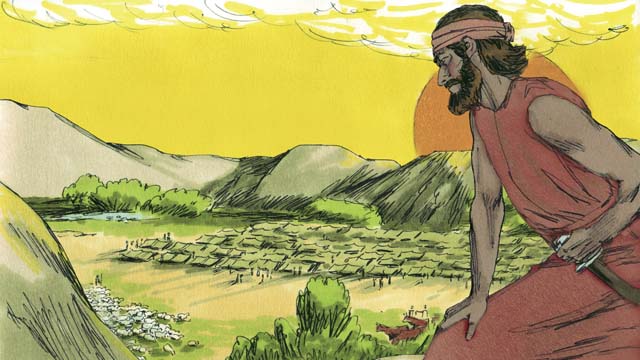
Then God provided a deliverer who rescued them from their enemies and brought peace to the land. But then the people forgot about God and started worshiping idols again. So God allowed the Midianites, a nearby enemy people group, to defeat them.
于是上帝派遣了一位士师,使他们脱离了敌人的攻打,重新回到了和平,安宁的生活。但是他们随后又忘记了上帝的恩典,再次崇拜偶像。所以上帝让处于他们周边的米甸部落将他们打败。
Important Terms:
Translation Notes:
- God provided - This could be translated as, "God chose" or, "God appointed" or, "God raised up."
- brought peace - This could be translated as, "allowed the people to live without fear" or, "ended the fighting" or, "stopped their enemies from attacking them."
- the land - That refers to Canaan, the Promised Land that God had given to Abraham.
- the people forgot about God - This means, "The people stopped thinking about God and ignored what he had commanded them."
16-04
The Rule of Midian [16-04]
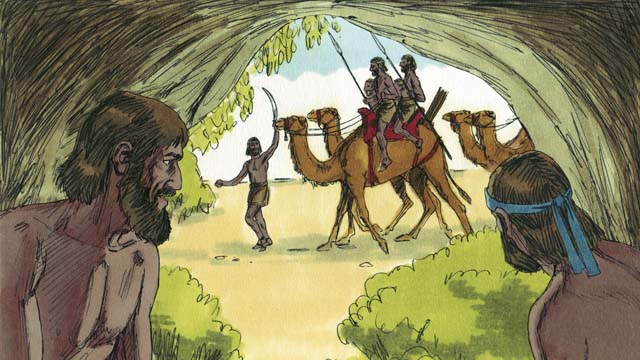
The Midianites took all of the Israelites' crops for seven years. The Israelites were so scared; they hid in caves so the Midianites would not find them. Finally, they cried out to God to save them.
米甸人连续七年掳走以色列人的粮食。他们十分害怕,为了不被米甸人发现,他们躲进了洞穴。最终,他们大声呼叫上帝来拯救他们。
Important Terms:
Translation Notes:
- crops - This refers to plants that the Israelites were growing in their gardens or fields for food.
- were so scared; they hid – This could be translated as, "were very afraid of the Midianites, so they hid."
- cried out - This might be translated as, "they called out" or, "they prayed desperately."
- save them – This might be translated as, "set them free" or, "rescue them from these enemies."
16-05
An Angel Spoke to Gideon [16-05]
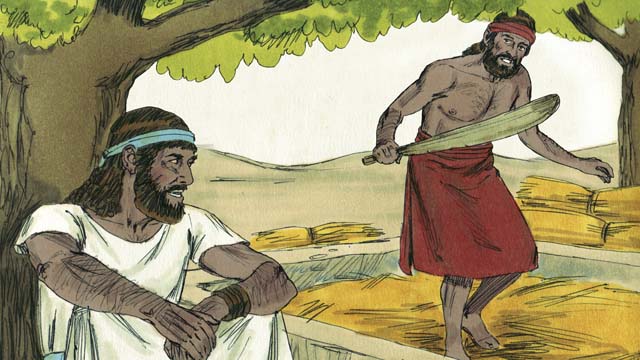
One day, a man of Israel named Gideon was threshing grain secretly so the Midianites would not steal it. The angel of Yahweh came to Gideon and said, “God is with you, mighty warrior. Go and save Israel from the Midianites.”
一天,一个叫基甸的勇士暗中收割谷物,防止米甸人过来盗窃。上帝的使者对他说“上帝与你同在,坚强的勇士。去拯救以色列人吧。"
Important Terms:
Translation Notes:
- One day - This phrase introduces an event that happened in the past, but does not state the specific time. Many languages have a similar way to begin telling a true story.
- threshing grain - The grain was wheat, which has a head of many small grains, or seeds, on the top of a thin stalk. "Threshing" is separating the seeds of the plant from the stalks by beating the heads of grain. The seeds are food, but the stalks are not.
- secretly - Gideon was threshing the grain in a hidden location, so the Midianites would not see him.
- God is with you – This means, "God is present with you in a special way" or, "God has plans to use you in a special way."
16-06
Gideon Destroyed the Idol [16-06]
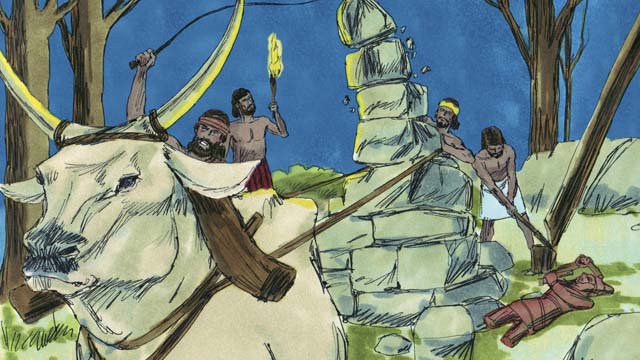
Gideon's father had an altar dedicated to an idol. God told Gideon to tear down that altar. But Gideon was afraid of the people, so he waited until nighttime. Then he tore down the altar and smashed it to pieces. He built a new altar to God near where the altar to the idol used to be and made a sacrifice to God on it.
上帝让基甸去摧毁他父亲的偶像。吉迪恩怕众人反对,于是等到夜间才行动。他摧毁了曾经的偶像,重新给上帝建了一座圣坛,并且向上帝献祭。
Important Terms:
Translation Notes:
- to tear down - This means, "to violently bring down" or, "to take down and destroy."
- afraid of the people - Gideon was afraid that his fellow Israelites who worshiped the same idol would be angry with him.
- waited until nighttime - Another way to say this would be, "waited until after dark." Gideon smashed the altar at night when everyone was asleep so that no one would see him do it.
16-07
Gideon Was Rescued [16-07]
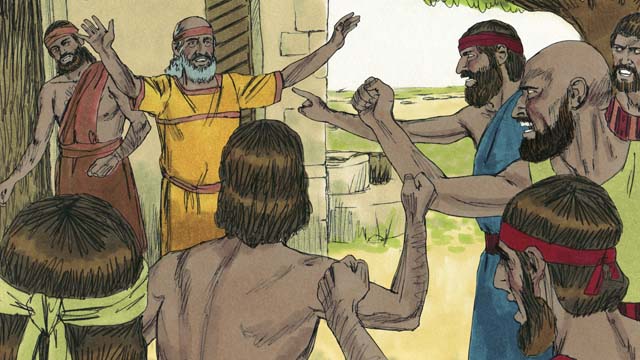
The next morning the people saw that someone had torn down and destroyed the altar, and they were very angry. They went to Gideon's house to kill him, but Gideon's father said, “Why are you trying to help your god? If he is a god, let him protect himself!” Because he said this, the people did not kill Gideon.
次日早晨,人们看见偶像被摧毁,于是十分生气。他们来到基甸家中,想要杀死他。但是基甸的父亲说:" 你们为什么企图拯救你们的神呢?如果他们真是上帝,那就让他们自己拯救自己吧!最后,基甸获救了。
Important Terms:
Translation Notes:
- Why are you trying to help your god? - This is not a real question that asks for information. Another way of saying this would be, "You should not be trying to help your god" or, "You should not need to help your god."
- If he is a god, let him protect himself - This means, "If he were truly a god, he would be able to defend himself."
16-08
Midian Attacked Israel Again [16-08]
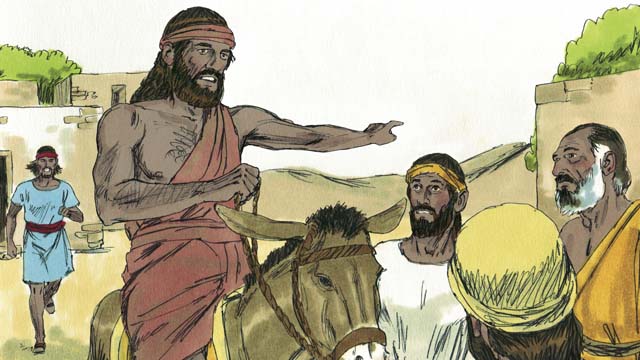
Then the Midianites came again to steal from the Israelites. There were so many of them that they could not be counted. Gideon called the Israelites together to fight them. Gideon asked God for two signs so he could be sure that God would use him to save Israel.
后来米甸人又来盗窃以色列人。米甸人数量之多,数不胜数。基甸号召以色列人同心协力起来反抗。他请求上帝给了两个暗示,以此确保上帝是派遣他来拯救以色列民的。
Important Terms:
Translation Notes:
- came again to steal from the Israelites – This could be translated as, "came again to the Israelites' land to steal things from them."
- they could not be counted - This could be translated as, "The number of the Midianites was too great to count" or, "it would be very difficult to count all of the Midianites."
- for two signs - This could be translated as, "to do two miracles" or, "to make two impossible things happen."
- that God would use him – This could be translated as, "that God would enable him" or, "that God would help him" or, "that God was calling him."
- to save Israel - This could be translated as, "to rescue Israel from the Midianites."
16-09
The Wet Cloth [16-09]
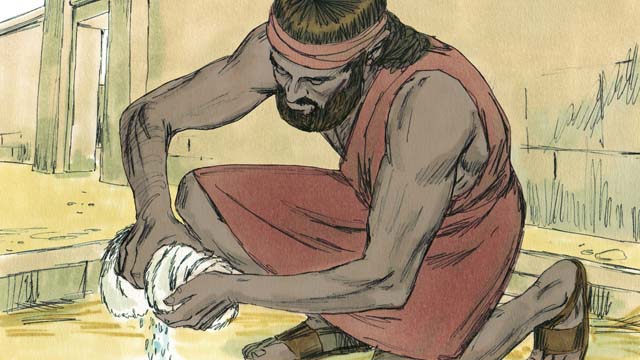
For the first sign, Gideon laid a cloth on the ground and asked God to let the morning dew fall only on the cloth and not on the ground. God did that. The next night, he asked that the ground be wet but the cloth dry. God did that too. These two signs convinced Gideon that God would use him to save Israel from the Midianites.
首先他在地上铺了一块布,求上帝使清晨的露珠单单落在这布上。上帝成全了。次日晚上,他请求上帝使地面潮湿,唯有布是干的。上帝也成全了。
Important Terms:
Translation Notes:
- sign - This could be translated as, "miracle" or, "impossible thing."
- let the morning dew fall - This can be translated as, "make the morning dew appear" or, "make the morning dew come up." "Dew" refers to the drops of water that appear on the ground in the morning. Dew naturally covers everything equally.
- God did that - This could be translated as, "God did what Gideon asked him to do."
16-10
Too Many Soldiers [16-10]
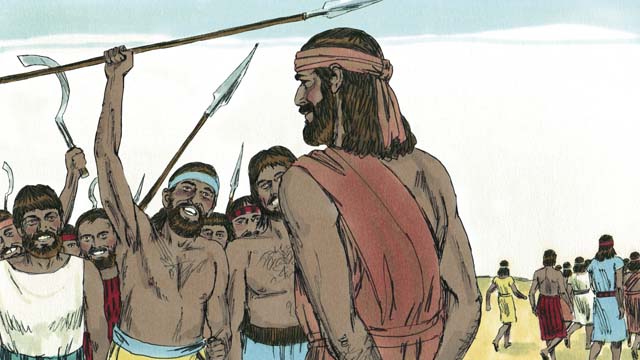
32,000 Israelite soldiers came to Gideon, but God told him this was too many. So Gideon sent home 22,000 who were afraid to fight. God told Gideon that he still had too many men. So Gideon sent all of them home except for 300 soldiers.
32000名以色列人来跟随基甸,但是上帝说人数太多了。于是基甸打发了22000个惧怕战斗的人回家。上帝告诉他人数仍然很多。所以基甸最后只留下300名战士。
Important Terms:
Translation Notes:
- 32,000 Israelite soldiers came to Gideon - Some languages might need to insert the following sentence at the beginning of the story: "Gideon called the Israelites to come fight against the Midianites." See [[:zh:obs:notes:frames:16-08|[16-08]]].
- too many - This was more soldiers than God wanted for this fight. If that many solders fought and won, they would think that they won the battle with their own strength, and they would not know that God did it.
- except for 300 soldiers - This sentence could be translated as, "So Gideon allowed only 300 men to stay, and the rest of the men went home."
16-11
The Midianite's Dream [16-11]
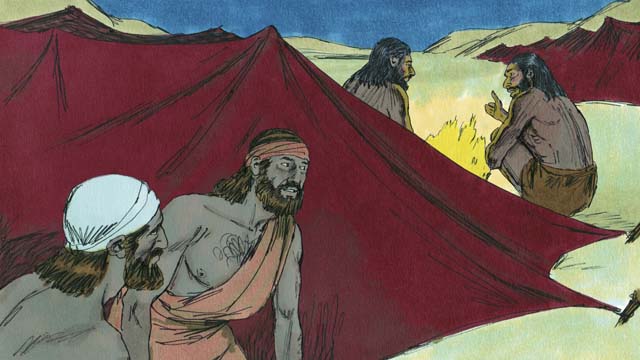
That night God told Gideon, “Go down to the Midianite camp and when you hear what they say, you will no longer be afraid.” So that night, Gideon went down to the camp and heard a Midianite soldier telling his friend about something he had dreamed. The man’s friend said, “This dream means that Gideon's army will defeat the Midianite army!” When Gideon heard this, he worshiped God.
当天晚上上帝对基甸说:”去到米甸人的军营听听他们如何说,之后你便不会惧怕了。“所以基甸去了去了米甸人的军营,听到一个米甸士兵在和他的朋友说一个梦。他的朋友说,这个梦预示着基甸将会大败米甸。基甸敬拜了大能的主。
Important Terms:
Translation Notes:
- Go down - The Midianite soldiers were camping out in a valley and were at a lower elevation than the Israelite soldiers.
- you will no longer be afraid – That is, "you will stop being afraid."
- something he had dreamed – That is, "something he had seen in a dream" or, "a dream he had had."
16-12
Gideon's Army [16-12]
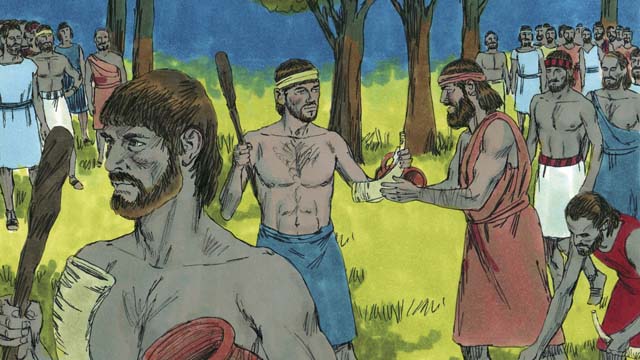
Then Gideon returned to his soldiers and gave each of them a horn, a clay pot, and a torch. They surrounded the camp where the Midianite soldiers were sleeping. Gideon's 300 soldiers had the torches in the pots so the Midianites could not see the light of the torches.
后来,基甸来到以色列士兵那里,给每个人发了号角,粘土锅还有一个火炬。他们趁米甸人睡觉的时候将他们包围了。这300个人将火炬统统放入锅中,这样就没有人看到他们了。
Important Terms:
Translation Notes:
- horn - This could be translated as, "trumpet" or, "ram's horn trumpet." These horns came from a male sheep and were often used to call men for battle.
- a torch - This was probably a piece of wood wrapped with cloth and soaked in oil so that it could burn well. (This was not the modern torch that runs on batteries.)
16-13
The Attack [16-13]
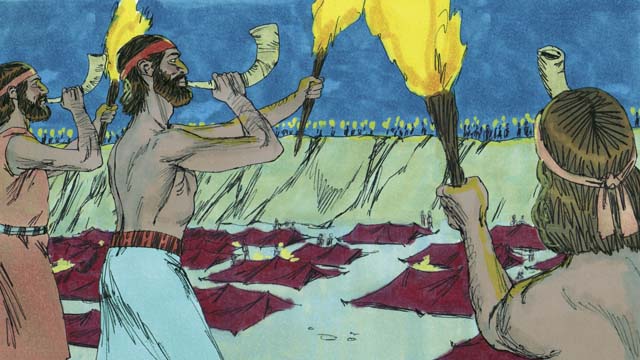
Then, all of Gideon's soldiers broke their pots at the same moment, suddenly revealing the fire of the torches. They blew their horns and shouted, “A sword for Yahweh and for Gideon!”
与此同时,他们将藏着火炬的粘土锅打碎。他们吹响号角,大声呼喊“为上帝而战,为基甸而战!”
Important Terms:
Translation Notes:
- shouted - This could be translated as, "yelled loudly" or, "said with a very loud voice."
- sword - A sword is a weapon that has a long sharp blade and a handle at one end. People hold the handle and hit or stab the enemy with the sharp blade. If your people don't have a weapon just like this, you could translate it as a "long knife," "machete" or, "bush knife."
- A sword for Yahweh and for Gideon - This means, "We fight for Yahweh and for Gideon!"
16-14
God Defeated the Midianites [16-14]
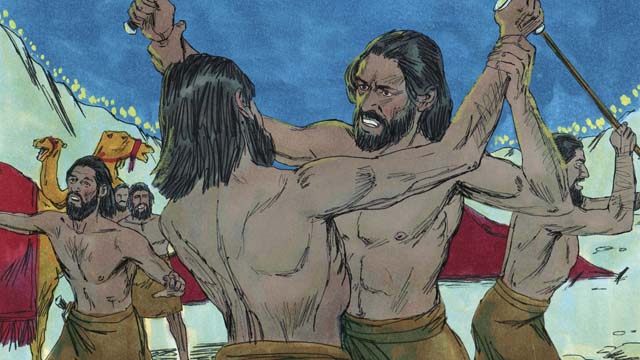
God confused the Midianites, so that they started attacking and killing each other. Immediately, the rest of the Israelites were called from their homes to come help chase the Midianites. They killed many of them and chased the rest of them out of the Israelites' land. 120,000 Midianites died that day. God had saved Israel.
上帝迷惑了米甸人,于是他们彼此攻击,互相残杀。他们杀害了很多自己人,还将剩余的人赶出他们的土地。120000米甸人死了,上帝拯救了以色列人。
Important Terms:
Translation Notes:
- God confused the Midianites - God caused the Midianites to be confused. They wanted to attack the Israelites, but instead, they attacked each other.
- the rest of the Israelites - This could be translated as, "many other Israelite men." This refers to the soldiers previously sent home in [[:zh:obs:notes:frames:16-10|[16-10]]].
- were called – That is, "were called out" or, "were summoned." This sentence could also be translated as, "Gideon sent messengers to summon many other Israelite men from their homes."
16-15
An Offering for Gideon [16-15]
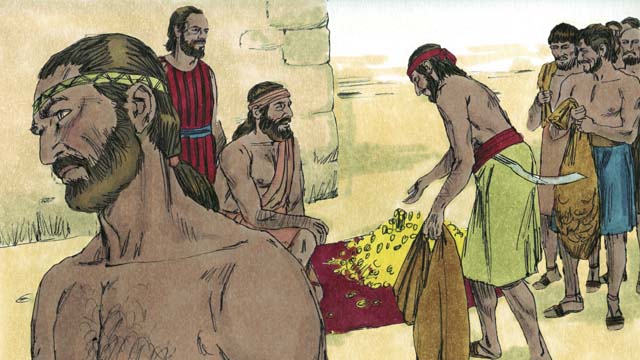
The people wanted to make Gideon their king. Gideon did not allow them to do this, but he asked them for some of the gold rings that each of them had taken from the Midianites. The people gave Gideon a large amount of gold.
以色列人想要使基甸成为他们的王。基甸聪明的拒绝了他们的请求。但是基甸向他们要了一些从敌人那里获得的金钱。他得到了一大笔钱。
Important Terms:
Translation Notes:
- did not allow them to do this - Gideon knew that it was better for the Israelites to have God as their king.
- but he asked them – This phrase starts with "but" because what he did next was not wise.
16-16
Gideon Made an Idol [16-16]
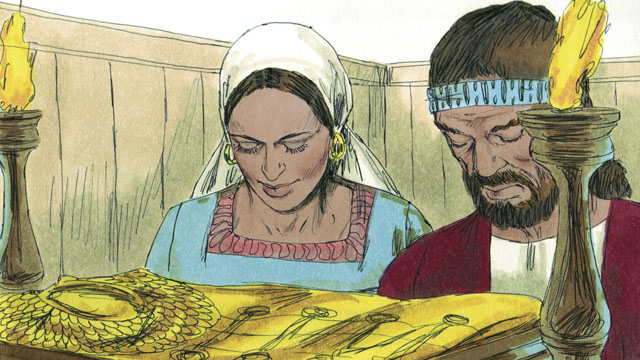
Then Gideon used the gold to make a special garment like the high priest used to wear. But the people started worshiping it as if it were an idol. So God punished Israel again because they worshiped idols. God allowed their enemies to defeat them. They finally asked God for help again, and God sent them another deliverer.
基甸做了一件愚蠢的事情。他将金钱视为偶像,于是人们再一次远离上帝。他们开始拜基甸为偶像。
Important Terms:
Translation Notes:
- Gideon used the gold to make a special garment – This could be translated as, "Gideon melted down the gold objects the people had given him and formed a special garment out of that gold."
- turned away from God - This could be translated as, "disobeyed God" or, "stopped worshiping God."
16-17
Sin and Deliverance [16-17]
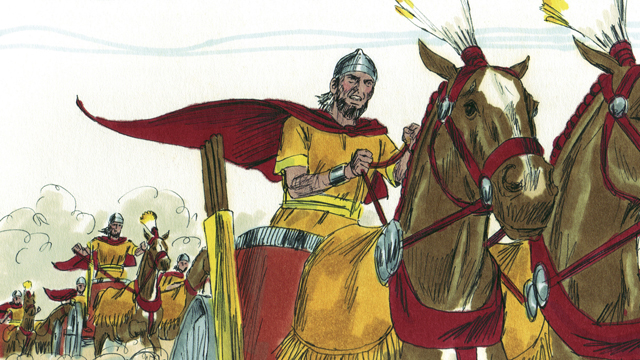
This pattern repeated many times: the Israelites would sin, God would punish them, they would repent, and God would send a deliverer to save them. Over many years, God sent many deliverers who saved the Israelites from their enemies.
上帝再一次因以色列人拜偶像而惩罚他们。他们被敌人打败。最后去求上帝,上帝派遣另外一个士师。这种犯罪,惩罚,忏悔,士师的模式一次次重复着。上帝派遣了很多士师,他们拯救以色列人,摆脱了敌人。
Important Terms:
Translation Notes:
- This pattern repeated many times - This could be translated as, "These things kept happening again and again" or, "These things happened many times."
16-18
Israel Wanted a King [16-18]
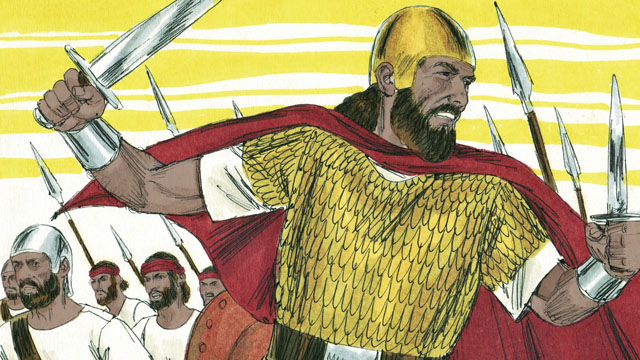
Finally, the people asked God for a king like all the other nations had. They wanted a king who was tall and strong, and who could lead them into battle. God did not like this request, but he gave them a king just as they had asked.
最后,以色列人也想和其它名族一样拥有自己的国王。他们想要一个高大强壮,能够带领他们的国王。上帝并不喜欢这个请求。但他还是应许他们,为他们设立了国王。
Important Terms:
Translation Notes:
- Finally - This could be translated as, "After their enemies attacked them many times" or, "After many years of being attacked by many different nations."
- asked God for a king - This could be translated as, "demanded that God give them a king" or, "kept asking God for a king."
- like all the other nations had - Other nations had a king. Israel wanted to be like them and have a king too.
- God did not like this request – This could be translated as, "God did not agree with what they had asked him for." God knew that they were rejecting him as their ruler and were instead choosing to follow a human leader.
- A Bible story from - These references may be slightly different in some Bible translations.
